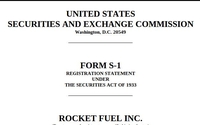Rocket Fuel Files For $100 Million IP0, Discloses Impressive Growth, Losses Too
- by Joe Mandese @mp_joemandese, August 19, 2013
 Programmatic media-buying technologies have begun to fuel Wall Street’s public marketplace, and it looks like Madison Avenue’s next big
IPO may even utilize some rocket fuel. In a filing to begin trading shares under the ticker FUEL, programmatic ad trading technology developer Rocket Fuel said it plans to raise $100 million in an
initial offering to, well, fuel its growth.
Programmatic media-buying technologies have begun to fuel Wall Street’s public marketplace, and it looks like Madison Avenue’s next big
IPO may even utilize some rocket fuel. In a filing to begin trading shares under the ticker FUEL, programmatic ad trading technology developer Rocket Fuel said it plans to raise $100 million in an
initial offering to, well, fuel its growth. The move follows a spate of recent IPOs among advertising technology companies that are helping to automate media-buying -- including video ad networks Tremor Video and YuMe -- and comes as Wall Street is beginning to pay close attention to programmatic trading, not in the financial marketplace, but in the advertising marketplace.
“Programmatic is the new buzzword,” Wall Street analyst Brian Wieser wrote in an equities research report on the advertising technology sector sent to investors on Friday. In addition to recent IPOs, he cited an upswing in M&As, including AOL’s $405 million deal to acquire Adap.TV and Millennial Media’s acquisition as Jumptap, as reasons to believe that the programmatic media-buying business is hot among investors, as well as advertisers and agencies.
In its proposed IPO filing with the Securities and Exchange Commission, Rocket Fuel, which specializes in utilizing artificial intelligence to make programmatic ad trades even more effective and efficient, says pretty much the same thing.
“Digital advertising is shifting to market-driven, real-time bidding systems,” the filing reads, adding, “the emergence of programmatic buying, which enables the automated purchasing of advertising inventory; the creation of an abundance of digital advertising inventory, which has grown substantially as consumers and content have continued to migrate online; increased use of real-time advertising exchanges by publishers; and recognition by advertisers that using real-time advertising exchanges is an effective way to achieve their campaign goals. Adding to these trends is the virtuous cycle that has been created as publishers increase inventory supply, enabling better advertising results, which then increases demand for additional advertising inventory, leading to increased incentives for publishers to make additional inventory available through real-time advertising exchanges.”
The filing does disclose risks to potential investors, including privacy legislation and regulation, and enforcement of potential ‘Do Not Track’ standards that would limit Rocket Fuel’s access to “the anonymous user data that informs the advertising campaigns we run, and as a result may degrade our performance for our customers.”
The IPO doesn’t list proposed share pricing for Rocket Fuel’s offering, so it’s not yet possible to put a potential public market value on the company, but in the offering it noted that its revenues and advertiser customer base have also been rocket fueled. The company said its revenues more than doubled to $106.6 million in 2012 -- up from $44.7 million in 2011 -- and nearly tripled for the first six months of 2013 to $92.6 million from $39.6 million during the first six months of 2012. The number of advertisers actively using Rocket Fuel’s programmatic media-buying systems has also more than doubled to 784 from 341 a year ago.
As fast as it’s growing, Rocket Fuel also reported something that analysts say has been a drag on other recent ad tech IPOs: losses.
“We have a history of losses and may not achieve or sustain profitability in the future,” it disclosed, citing net losses $4.3 million and $10.3 million in 2011 and 2012, respectively, and a net loss of $11.9 million for the six months ended June 30, 2013. As of June 30, 2013, we had an accumulated deficit of $35.5 million. We may not achieve profitability in the foreseeable future, if at all.”
Meanwhile, the company indicated that the use of the proceeds from its public offering would help fuel its overall growth strategies, including its core business, global expansion, and “strategic acquisitions.”
“We intend to evaluate opportunities to acquire complementary businesses and technologies that are consistent with our overall growth strategy,” it said in the filing.



The good news with all this RTB/programmatic BS is the capability to now know in real time precisely what isn't working. As the ancient Vedic Seers observed, we become our attentions. That's why any publisher or brand should rightfully worry about an automated media management system designed and run by folks who check their Facebook pages 20 times a day.
"We may not achieve profit in the foreseeable future if at at all?" Guess it doesn't matter if you have a constant funnel of vc and investor cash to burn....
Impressive growth... in losses.
I'm not endorsing RocketFuel - nor am I a client, but just to clarify, when you're first to market, you typically roll up some high development costs, so seeing the losses increase doesn't exactly surprise me. I'd rather not see those - but from what I've seen, investors have bet on potential rather than numbers, so it will be interesting to see how this IPO turns out for them - as the industry (digital AND traditional is moving to a more automated/programmatic nature).
Also worth noting - the statement of "no profit in the foreseeable future" is a pretty standard boilerplate that goes on every IPO. You can't promise profits, and you have to warn against losses. So I wouldn't put too much weight on that...
Offering solutions at a loss is one way to win business. This works for some companies to gain secure footholds for future dividends, but not for an industry where the barriers of entry are getting lower.